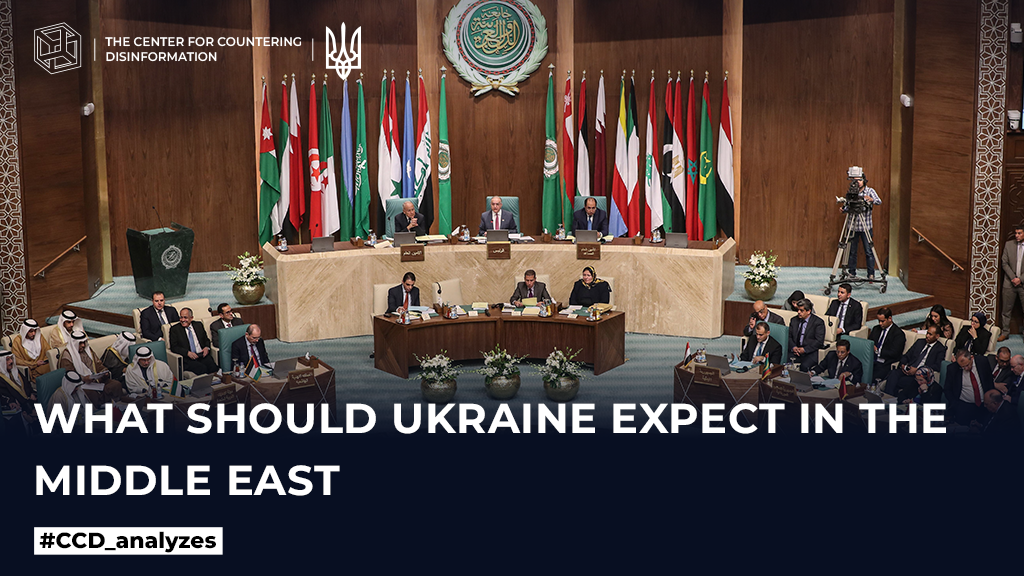The Middle East has always been considered as a promising region for cooperation for Ukraine, but mainly in the field of arms and grain sales, and political aspects were neglected. However, after February 24, 2022, the situation has changed, because russia’s aggression forced Kyiv to look for foreign policy allies all over the world, and it is fundamentally important for us to find points of contact with the Middle East.
Can Ukraine count on a multi-level dialogue with the countries of the Middle East?
The readiness of the countries of the Arab world for political and economic dialogue with Ukraine is determined, first of all, by the level of their dependence on russia and the countries of the West. Some of them take a cautious position due to the desire to distance themselves from the war in Ukraine and not to be drawn into the confrontation between russia and the West. Others see the russian war as an opportunity to increase their political authority by offering the services of a mediator in the conflict.
So Syria is completely dependent on its main ally and was the first after russia to recognize the self-proclaimed “DNR” and “LNR” and voted against the March UN resolution condemning russian aggression.
Other countries in the Middle East are acting more cautiously and flexibly. Algeria, Iraq, Iran and the UAE refrained from condemning russian aggression in the UN. Some countries, like Morocco, did not participate in the vote at all.
During the war in Ukraine, Iran strengthened ties with russia, which purchases Iranian drones for strikes on Ukraine (neither Iran nor russia officially confirms this) and in the actual failure of negotiations with the United States regarding the nuclear program, expects to receive additional bonuses from russia.
Against the background of russian aggression against Ukraine, Turkey has turned into a powerful regional player, which finds benefits for itself in the confrontation between russia and the West. On the one hand, President R. Erdogan continues close cooperation with the kremlin, refuses to impose sanctions and does not cancel flights between the countries, and on the other – supplies Ukraine with drones and joins some of the restrictions, refusing, for example, to accept cards of the russian payment system “Mir”.
Saudi Arabia and the United Arab Emirates follow a similar path, balancing between russia and the West. Thus, Crown Prince of Saudi Arabia M. Salman refuses the USA and Europe to increase oil production, and the UAE does not interfere with the development of russian business. US attempts to involve the UAE, Oman and Turkey in the sanctions policy against the russian federation have not achieved results yet.
What contradictions in the foreign policy relations of the countries of the Middle East can Ukraine use?
Firstly, Kyiv can build relations using local geopolitical problems, in particular, play on the Syrian contradictions between russia and the countries of the region. After all, Turkey, Saudi Arabia, Qatar, the UAE, and Kuwait are oriented towards the US, categorically disagree with the russians regarding the future of Syria, and in one way or another support the local opposition, which russian and Syrian troops are fighting.
Secondly, among the Middle Eastern countries, Turkey remains a key economic partner and strategic ally. Although Turkish President R. Erdogan follows an authoritarian path, in the foreign policy arena his interests largely coincide with Ukrainian ones, in particular in terms of creating a geopolitical counterbalance to russia in the Middle East region. In addition, Turkey does not recognize the annexation of Crimea and actively supports the Crimean Tatars. Against the background of the “special relations” of the presidents of Turkey and Ukraine and Turkey’s agreement to participate in the “Crimean Platform”, the supply of UAVs, the creation of joint defense enterprises, there is every reason to hope for the further development of relations.
Thirdly, Arab audiences are not concerned about the essence of military conflicts in Europe, but their direct consequences in the form of rising oil prices, grain shortages and inflation. Therefore, the traditional allies of both the US and russia today will continue to cooperate with all parties as long as it is in their interests. Therefore, proving the advantages of cooperation with Ukraine should become the main trend of contacts at the diplomatic and higher state levels.
After all, Ukraine has the potential to develop economic relations with Arab countries in the fields of energy, oil production, tourism, shipbuilding, and cultural and humanitarian cooperation. In addition, the geographical position of Ukraine and the powerful complex of ports on the Black Sea coast allow it to be a transit point for many goods that are imported or exported from the Middle East.
The results of the visit of the Minister of Foreign Affairs of Ukraine D. Kuleba to Kuwait on April 18 testify to the effectiveness of such contacts. In addition to reaching an agreement on the country’s participation in the restoration of Ukrainian infrastructure, the negotiations also provided an opportunity to convey Ukraine’s principled positions and agree on visions and approaches to diplomatic efforts to end russian aggression.










